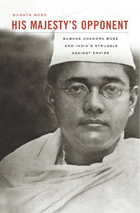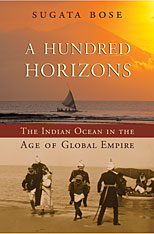
A concise new history of a century of struggles to define Asian identity and express alternatives to European forms of universalism.
The balance of global power changed profoundly over the course of the twentieth century, above all with the economic and political rise of Asia. Asia after Europe is a bold new interpretation of the period, focusing on the conflicting and overlapping ways in which Asians have conceived their bonds and their roles in the world. Tracking the circulation of ideas and people across colonial and national borders, Sugata Bose explores developments in Asian thought, art, and politics that defied Euro-American models and defined Asianness as a locus of solidarity for all humanity.
Impressive in scale, yet driven by the stories of fascinating and influential individuals, Asia after Europe examines early intimations of Asian solidarity and universalism preceding Japan’s victory over Russia in 1905; the revolutionary collaborations of the First World War and its aftermath, when Asian universalism took shape alongside Wilsonian internationalism and Bolshevism; the impact of the Great Depression and Second World War on the idea of Asia; and the persistence of forms of Asian universalism in the postwar period, despite the consolidation of postcolonial nation-states on a European model.
Diverse Asian universalisms were forged and fractured through phases of poverty and prosperity, among elites and common people, throughout the span of the twentieth century. Noting the endurance of nationalist rivalries, often tied to religious exclusion and violence, Bose concludes with reflections on the continuing potential of political thought beyond European definitions of reason, nation, and identity.

The man whom Indian nationalists perceived as the “George Washington of India” and who was President of the Indian National Congress in 1938–1939 is a legendary figure. Called Netaji (“leader”) by his countrymen, Subhas Chandra Bose struggled all his life to liberate his people from British rule and, in pursuit of that goal, raised and led the Indian National Army against Allied Forces during World War II. His patriotism, as Gandhi asserted, was second to none, but his actions aroused controversy in India and condemnation in the West.
Now, in a definitive biography of the revered Indian nationalist, Sugata Bose deftly explores a charismatic personality whose public and private life encapsulated the contradictions of world history in the first half of the twentieth century. He brilliantly evokes Netaji’s formation in the intellectual milieu of Calcutta and Cambridge, probes his thoughts and relations during years of exile, and analyzes his ascent to the peak of nationalist politics. Amidst riveting accounts of imprisonment and travels, we glimpse the profundity of his struggle: to unite Hindu and Muslim, men and women, and diverse linguistic groups within a single independent Indian nation. Finally, an authoritative account of his untimely death in a plane crash will put to rest rumors about the fate of this “deathless hero.”
This epic of a life larger than its legend is both intimate, based on family archives, and global in significance. His Majesty’s Opponent establishes Bose among the giants of Indian and world history.

On December 26, 2004, giant tsunami waves destroyed communities around the Indian Ocean, from Indonesia to Kenya. Beyond the horrific death toll, this wall of water brought a telling reminder of the interconnectedness of the many countries on the ocean rim, and the insignificance of national boundaries. A Hundred Horizons takes us to these shores, in a brilliant reinterpretation of how culture developed and history was made at the height of the British raj.
Between 1850 and 1950, the Indian Ocean teemed with people, commodities, and ideas: pilgrims and armies, commerce and labor, the politics of Mahatma Gandhi and the poetry of Rabindranath Tagore were all linked in surprising ways. Sugata Bose finds in these intricate social and economic webs evidence of the interdependence of the peoples of the lands beyond the horizon, from the Middle East to East Africa to Southeast Asia.
In following this narrative, we discover that our usual ways of looking at history--through the lens of nationalism or globalization--are not adequate. The national ideal did not simply give way to inevitable globalization in the late twentieth century, as is often supposed; Bose reveals instead the vital importance of an intermediate historical space, where interregional geographic entities like the Indian Ocean rim foster nationalist identities and goals yet simultaneously facilitate interaction among communities.
A Hundred Horizons merges statistics and myth, history and poetry, in a remarkable reconstruction of how a region's culture, economy, politics, and imagination are woven together in time and place.
READERS
Browse our collection.
PUBLISHERS
See BiblioVault's publisher services.
STUDENT SERVICES
Files for college accessibility offices.
UChicago Accessibility Resources
home | accessibility | search | about | contact us
BiblioVault ® 2001 - 2024
The University of Chicago Press









